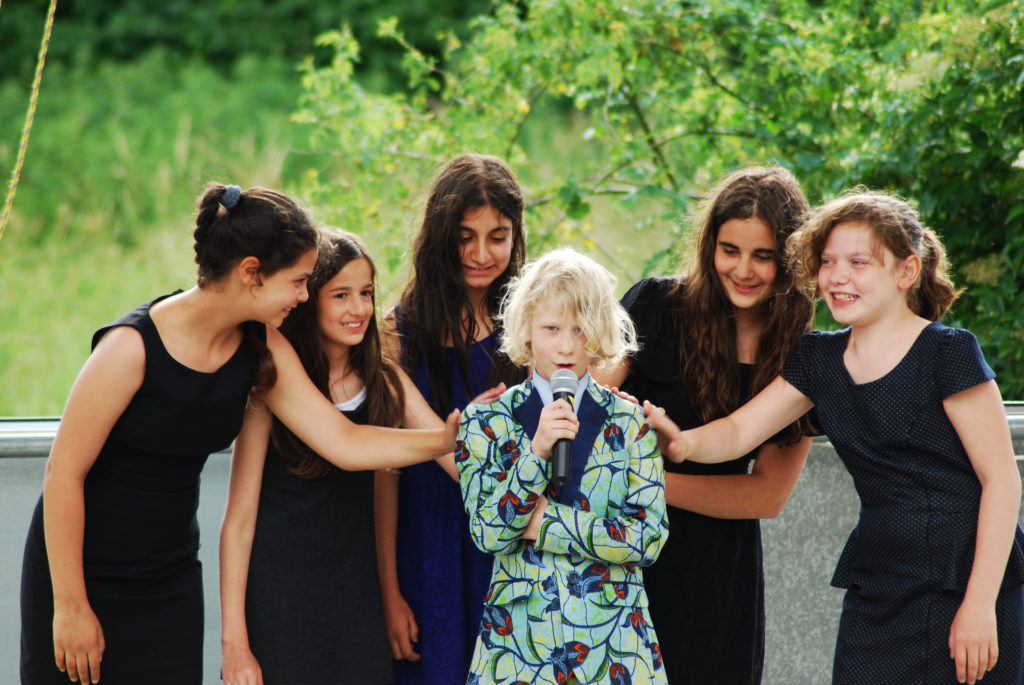In Junipark.
A guest’s view by Antonia Weisz, town clerk for Junipark:
Form and Style
On this early evening in JUNIPARK it’s all about living utopias beyond the realms of fear. Children dream. “WELTweit…Unterwegs” (worldwide on the move) is the name of a musical installation performance with pupils in the 4th, 5th and 6th grades of Nürtingen elementary school, Kreuzberg, Berlin under the direction of Anja Scheffer, Dascha Kornysheva and DJ B.Side. Parents, teachers, neighbours and schoolmates have come to the performance – the grandstand is full. Dressed to the nines, the girls in elegant gowns, the boys in suits and ties they delineate utopian residential installations, undeterred by the fact that Berlin is a city of disappearing niches. Why not conquer the sky and build an air dome that doesn’t demand recourse to a land registry office? They even have an answer to the quote “Berlin is a metropolis in transition”. They invented a house that can walk – from one place to another, to where it’s safe, dry and sunny. And don’t complain that living space has become scarce and too expensive. They’d rather sing to us how to deal with it:
“You don’t need a high school diploma or a good figure, just tarps, nails and a piece of string. The cord is stretched, the tarpaulin’s up. The tent is ready, it’s no trick. Now it’s ready, your mobile tent, now you can live where you like.”
Volunteers from the audience are invited to demonstrate that many people can fit in their dancing tent. With irony, chutzpah and the courage to question themselves and everything else, they are completely serious about it. Right in there. They showcase their construction manual as a top speed monologue. They make reference to materials that determine not only the form but also the spirit of their work: They revitalize objects, reinvigorate fabrics that already had a past life, advocate the use of curtains for their constructions, as then everyone can come in – rather than doors that can always lock someone in or out. Extremely enthusiastic about design, to which they propose the taking of initiative in their own right in a critical examination of their financial options. They all work under the motto: Speedy construction in pocket money format.
As they say in their song:
Come and be creative with us, for the world is not only negative, we search like detectives for a space, and build houses for almost nothing, pockets stuffed with rip-ties, and an eye on the design. Like the phoenix from the ashes emerges a house for happiness.
In any event, one thing is clear: personal commitment cannot be bought. A playground and a dream of life. And they really get down to business at the ensuing congress, entitled: Detect vacant lots and use them professionally. The meeting is made up of high-ranking specialists: a cleaning specialist who likes to tidy up, an expert for people with a fear of heights, an improvisation expert in polystyrene construction, a professor specializing in building in balloons and Zeppelins because the sky is still free. Even a caretaker who used to be an architect is invited. He chases away moles to create spaces underground. On the side, he now runs a mole spaetzle restaurant in Munich. Urgh, that sounds at once both disgusting and tasty. Anyhow, this evening I encounter sorely needed experts. Not so much because their house building ideas could actually be implemented, but because they make us dream:
Life can be that simple. That does you good. And the choir sings it to us once more:
Children must not disappear, no, we’re settling here,
overcoming all borders, just doing it ourselves.
At the end, the audience is called upon to develop their own visions and not to sort every thought into right or wrong immediately. Ironically, a show house catalogue is provided as a creative aid. In addition, built into the scaffolding, there are two more show houses to view. To give us adults a helping hand. That makes me confident. The young Berliners have fantasies and we, the audience, are thrilled. I see faces filled with hope. And yes, it’s true: the world is not only negative, even in these politically worrying times around the world. Imagination is good for everyone.
Text: Antonia Weisz, town clerk for Junipark.



















